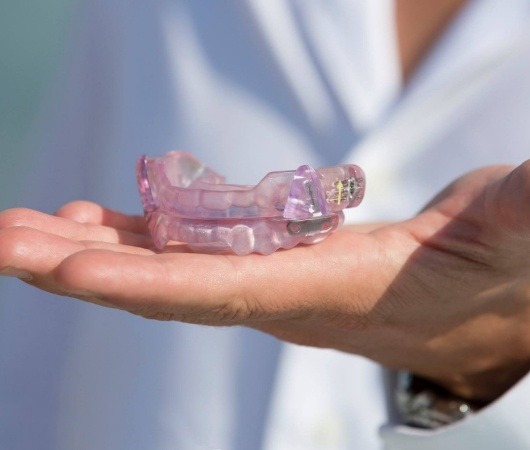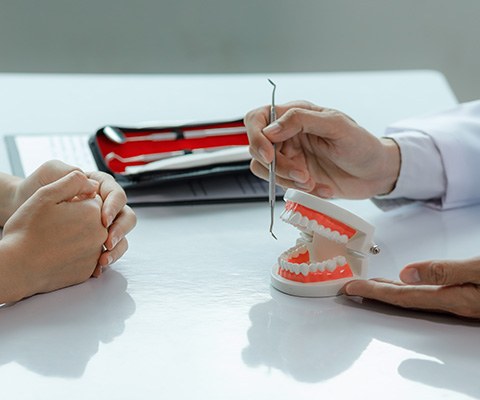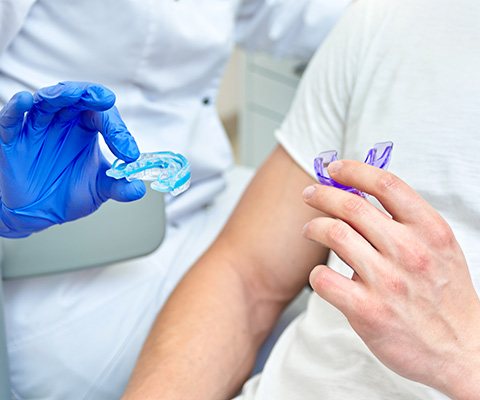TMJ Treatment – Derry, NH
Helping You Say Goodbye to Chronic Jaw Pain
Does your jaw pop or click each time you open or close your mouth? Do you wake with frequent headaches or soreness throughout your jaw and face? Temporomandibular joint (TMJ) dysfunction can become a debilitating problem if left untreated. However, with TMJ treatment performed by Dr. Berkal and our team, we can improve your quality of life by helping you to say goodbye to chronic jaw pain once and for all. Give us a call if you are interested in learning more about TMJ treatment in Derry.
Why Choose Brenda Berkal, DMD for TMJ Treatment?
- Customized Occlusal Splints Available
- Compassionate & Patient-Focused Approach
- Dental Practice Serving Derry Community Since 1986
Symptoms of TMJ Disorder

If you suffer from TMJ disorder, you may notice that you exhibit one or more of the following symptoms:
- Clicking or popping noise when attempting to open and close your mouth
- Frequent headaches
- Pain throughout your jaw and face
- Difficulty chewing and eating
- Lockjaw
- Stiff jaw muscles
- Earaches or ringing in the ears
Although pain is a leading indicator of TMJ disorder, do not dismiss any of the other above-mentioned symptoms. Getting treatment sooner rather than later will help to address the discomfort and inability to perform daily tasks much more quickly.
Types of TMJ Treatment

Dr. Brenda Berkal and our team of professionals are pleased to offer patients two effective solutions that will help to treat TMJ disorder. These include:
Occlusal splints – Customized to fit your mouth comfortably, we can create an occlusal splint that you will wear to help improve jaw movement. As a removable oral device, you will wear it according to the instructions provided by our team. The device will help to reposition your jaw so that it remains in a more comfortable position. As you continue to wear the appliance, you will notice reduced inflammation and an improvement in your symptoms.
Occlusal adjustment/equilibration - This is the process of reshaping various teeth to keep your jaw working as it should. By performing this minor procedure, we can help your teeth to fit together in a way that allows your jaw to move correctly within its socket. Not only are your jaw muscles likely to relax, but you’ll notice reduced inflammation and an improvement in your symptoms.
NTI Appliances

If you struggle with symptoms of TMJ disorder (TMD) or bruxism (teeth grinding and clenching), Dr. Berkal might recommend that you start using an NTI appliance, a custom appliance that can help your muscles to relax and prevent teeth grinding. These devices are slightly different from traditional nightguards and have been proven to be effective for many patients. They offer a comfortable, convenient, and non-invasive way to address one of the root causes behind muscular pain and related symptoms.
What Is an NTI Appliance?

NTI stands for Nociceptive Trigeminal Inhibition Tension mouthguard. It is a type of deprogramming device. All of that might sound a bit complicated, but the basic concept is pretty easy to understand. Essentially, an NTI is a small, mouthguard-like device that is worn toward the front of the mouth. It prevents the back teeth from touching one another, which can help to relieve muscular stress and reduce TMD-related headaches.
If you try to grind your teeth while wearing an NTI device, it activates a reflex that forces your jaw to relax. In other words, it trains your muscles to stop grinding your teeth.
Dr. Berkal will talk with you about how long you will wear this device. It is not used as a long-term solution for protecting your teeth from clenching and grinding forces. It is a device that allows you and Dr. to see if an occlusal guard is the right solution for long term comfort and protection.
How Are NTI Appliances Different from Traditional Nightguards?

A traditional nightguard for bruxism places a physical barrier between the upper and lower teeth. Therefore, even though it allows for the activation of the muscles involved in grinding and clenching, it prevents your upper and lower teeth from damaging one another.
NTI devices do not create such a barrier; in fact, they are usually worn just on the front teeth. They work by activating a reflex that prevents grinding and clenching altogether.
Another key difference between regular nightguards and NTI appliances is that NTI devices tend to be smaller in size.
What Are the Benefits of NTI Appliances?

Some benefits of NTI appliances include:
- They can train your muscles to stop grinding and clenching. This can reduce pain and protect your teeth from damage.
- They are usually more affordable than traditional nightguards. Of course, multiple factors can affect pricing. We can discuss specific numbers during your consultation.
- They can help Dr. Berkal make a diagnosis. If you respond well to NTI therapy, that means your muscles were responsible for your symptoms. If your response is less than expected, a traditional night guard is not the solution. There may be an issue within your jaw joints and further investigation will be needed.
- They are comfortable. Their small size may make them easier to wear than larger, full-arch occlusal splints. This often helps patients transition in to the traditional nightguard that will protect all of the teeth.
Would you like to find out if you are a candidate for an NTI device? Contact our team today to request a consultation with Dr. Berkal.

